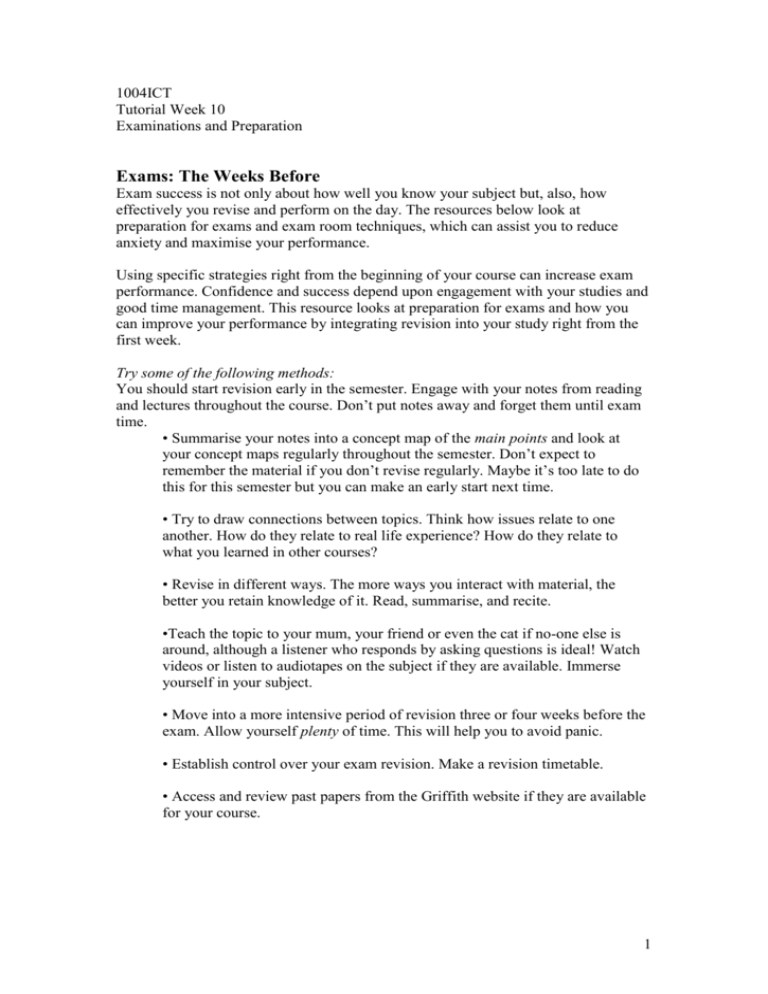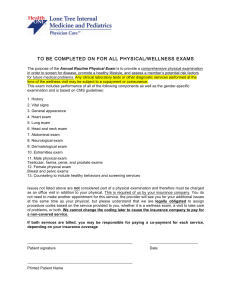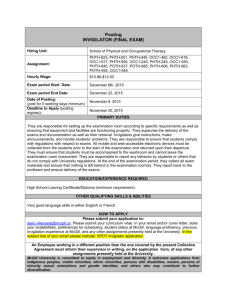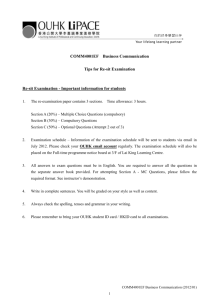Exam Preparation
advertisement

1004ICT Tutorial Week 10 Examinations and Preparation Exams: The Weeks Before Exam success is not only about how well you know your subject but, also, how effectively you revise and perform on the day. The resources below look at preparation for exams and exam room techniques, which can assist you to reduce anxiety and maximise your performance. Using specific strategies right from the beginning of your course can increase exam performance. Confidence and success depend upon engagement with your studies and good time management. This resource looks at preparation for exams and how you can improve your performance by integrating revision into your study right from the first week. Try some of the following methods: You should start revision early in the semester. Engage with your notes from reading and lectures throughout the course. Don’t put notes away and forget them until exam time. • Summarise your notes into a concept map of the main points and look at your concept maps regularly throughout the semester. Don’t expect to remember the material if you don’t revise regularly. Maybe it’s too late to do this for this semester but you can make an early start next time. • Try to draw connections between topics. Think how issues relate to one another. How do they relate to real life experience? How do they relate to what you learned in other courses? • Revise in different ways. The more ways you interact with material, the better you retain knowledge of it. Read, summarise, and recite. •Teach the topic to your mum, your friend or even the cat if no-one else is around, although a listener who responds by asking questions is ideal! Watch videos or listen to audiotapes on the subject if they are available. Immerse yourself in your subject. • Move into a more intensive period of revision three or four weeks before the exam. Allow yourself plenty of time. This will help you to avoid panic. • Establish control over your exam revision. Make a revision timetable. • Access and review past papers from the Griffith website if they are available for your course. 1 Prior to the Exam Your confidence will increase if you feel well prepared. The main thing is to be well organised and well informed. Be clear about what type of questions will appear in the exam. Your lecturer and tutor will tell you what kind of exam you can expect, e.g. open book, closed book, multiple choice etc. The questions covered are usually what you have studied in the course. Ask your teachers about the focus of the exam well in advance. Once you have chosen the topics you wish to revise: • Put them into your revision timetable. • Reduce your concept maps topics onto flash cards. Look at these regularly. Use spare moments such as on the bus or standing in queues. Don’t waste those little pockets of time. • Make sure you get plenty of rest. A good night’s sleep is very important. • Don’t drink too much alcohol or tea and coffee. You may become overstimulated and panicky. • Eat regular meals. Studying for exams can be intense. Sustain your energy levels. • Make some time for physical exercise. This has a calming effect. Need to Know More Reference List: • Cottrell, S. (2003). The study skills handbook (2 ed.). London: Palgrave. • Orr, F. (1992). Study skills for successful students. St Leonards, NSW: Allen & Unwin. • Cooper, G. (2003). The intelligent student’s guide to learning at university. Altona, Vic: Common Ground. External Links: ‘Studying for exams’ (University of New South Wales) www.lc.unsw.edu.au/onlib/exam.html • ‘How to revise’ (The International Education Site): www.intstudy.com/articles/wc274a09.htm • ‘Exam strategies’ (La Trobe University): www.latrobe.edu.au/lasu/services/Exam%20strategies.pdf Adapted from:Learning@Griffith/1004ICT/Resources/ Exam Preparation www.griffith.edu.au/ins/learningservices Griffith University 2006 Apart from fair dealing as permitted by the copyright law of your country, this work may be reproduced in whole or in part for non-profit educational use, provided correct attribution is given. Abstracting with credit is permitted. Other uses should be discussed with the copyright owner. 2 You are in the Exam Venue About to START: Just before the examination begins you will be permitted to enter the examination room. Make sure mobile phone is turned off. You will be directed as to where to place your bag and where to sit. Take what you need (e.g. pens that work) with you. Place your student ID on the desk and fill in the Attendance Form and the front page of your examination booklet (if required). Do not talk. Do not open your examination paper. Wait patiently for instructions. The invigilator, the person who runs the examination session, will formally commence the examination when everyone is seated. A list of instructions is read out about not cheating, not talking and when you are permitted to leave the examination room. Then the invigilator announces the beginning of the examination. Most examinations start with a perusal time of about ten minutes. During the perusal you can read your examination paper and may be able to make some notes on it. You are not permitted to write answers in your examination booklet. Adapted from: Turner, k., et al. (2008). Essential Academic Skills. General pointers Spend the first 5 minutes previewing the paper. Allocate time in proportion to the number of marks given. Before starting on each question, do a mind-dump. For questions that require writing, write down everything on the topic that comes to your mind. These will serve as cues for your writing later. Read the question carefully. Make sure you are answering the question as required. Leave 10 minutes for checking at the end. Check for o careless mistakes; o grammatical errors; o questions left unanswered when there should be none; o facts left out when they are relevant to the question. This is not ‘Survivor’. You do not get $50,000 for finishing first. Use all the time that is given to you. Notes for: Short answer questions Determine where the marks are allocated so that you divide your time and energy according to the marks, instead of trying to write 100% to 50% of the questions. Focus on what the question is asking for, and make sure you get to the point – answer it precisely. If time is short, make sure you cover questions in your areas of strength. 3 Notes for: Essay questions Check if you are supposed to answer all or only some of the questions. Consider the questions you plan to answer. Don’t be too quick to discard questions: think about the topics you are best equipped to answer. Give yourself a time-limit for each question, and move on once you have reached it. Analyse each question well so that you write on the topic. Draft your essay before writing. Remember to o Focus – on what the question is asking for o Support – your answer with relevant evidence o Organise – your writing with proper introduction, body, and conclusion Read through and edit your answer. If you run out of time, do an outline of points so that the marker can see that you were able to answer the question. University Examinations At University, you are required to go beyond just knowing, understanding, and even applying; as such, examination questions will often require you to demonstrate that you have thought deeply about what you have learned. Thus, to do well in University exams, it is not only important to KNOW what you know, but you have to be able to SHOW that you know what you know. The example below highlights 6 types of questions you are likely to encounter in your exams. Each type requires different levels of thought, which are demonstrated in the following ways: Question Type PART A Recognition & recall Level of Thinking Required (Based on Bloom’s Taxonomy) Knowledge PART B Comprehension Understanding PART C Application Application To demonstrate this level of thought, students should be able to… …recognize and define terms when appropriate …use ideas associated with content, without relating them to other ideas or subjects …apply learned ideas, concepts, principles, theories, or general solution methods to new situations 4 PART D Analysis PART E Synthesis PART F Evaluation Analysis Synthesis Evaluation …explain why something is the way it is …make logical sense of things … create something new (product or ideas), based on learned knowledge …think of ideas, concepts, and issues in new ways …discuss issues more extensively …make value judgments based on certain criteria such as usefulness and effectiveness Adapted from http://ceaspub.eas.asu.edu/MAE-EC2000/glossary.htm Adapted from: http://www.cdtl.nus.edu.sg/examprep/sec1.htm Jot Notes: Know the date, time, and venue for your exam/s – use a calendar with the details clearly displayed for each day of the exam period. Arrive at the examination in good time. Start revision this week. Attend the last couple of lectures – ask questions that might assist you to understand the exam process for 1004ICT. Remember: Don’t let what you cannot do interfere with what you CAN do (John Wooden). d.m.smith@griffith.edu.au 9/5/2009 5






